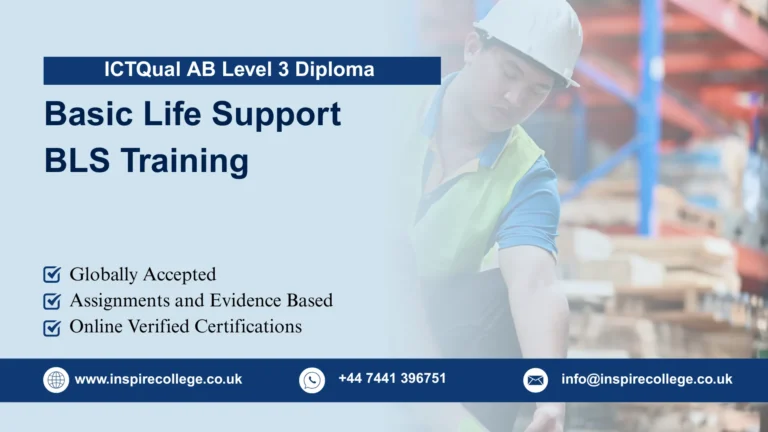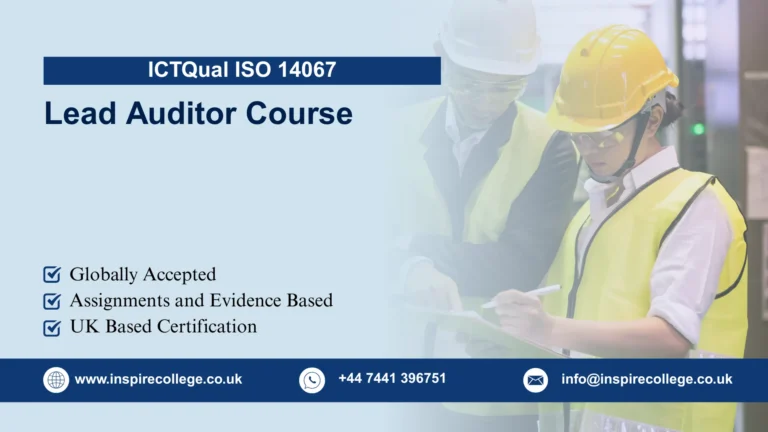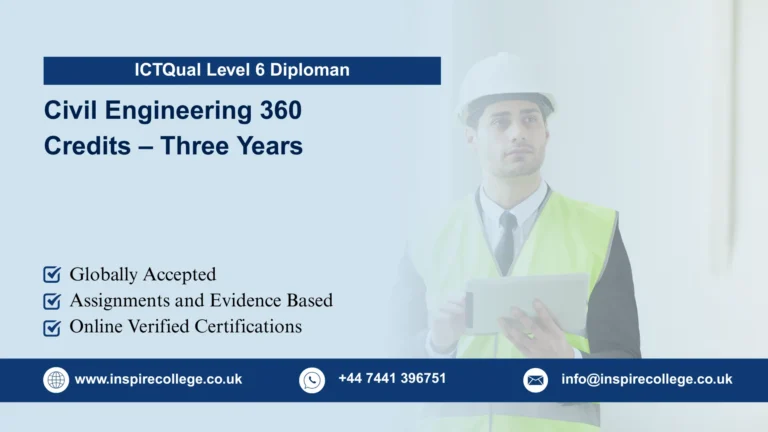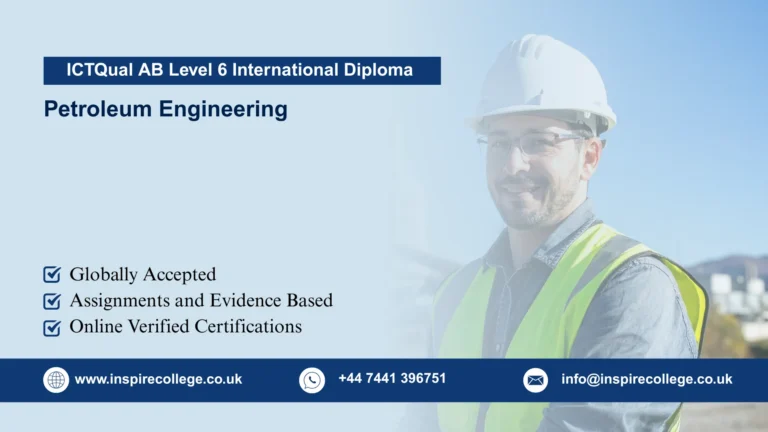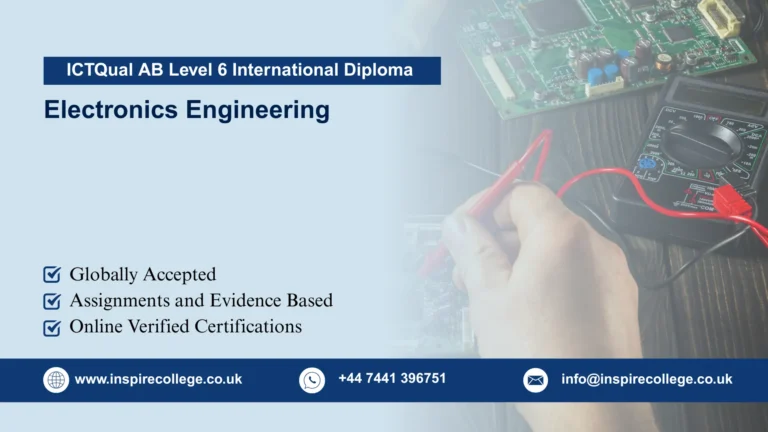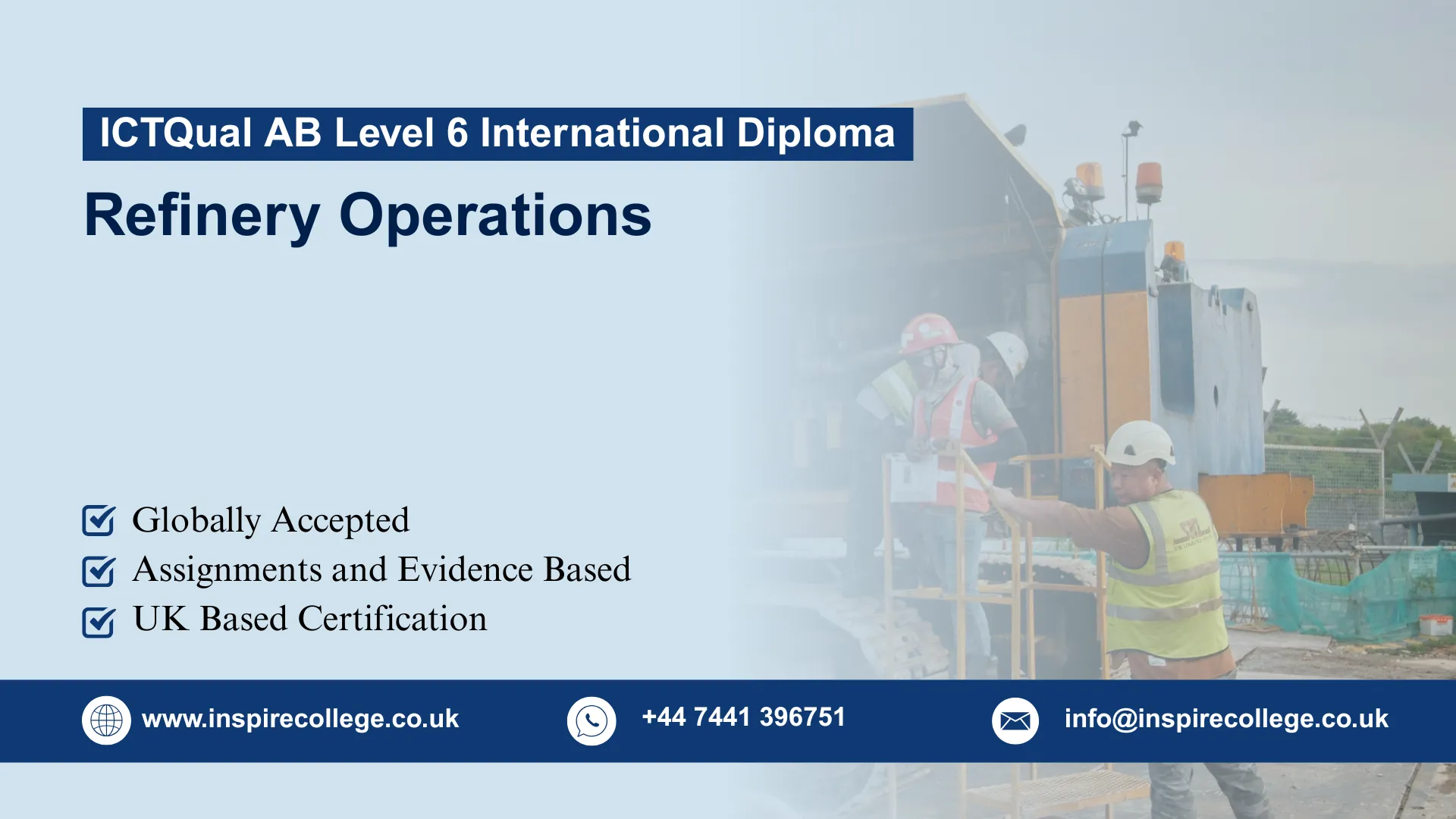
ICTQual AB Level 6 International Diploma in Refinery Operations
The ICTQual AB Level 6 International Diploma in Refinery Operations is a globally recognised qualification designed for learners aiming to excel in the oil and gas refining sector. This comprehensive programme equips learners with advanced technical knowledge, operational skills, and strategic insights required to manage complex refinery processes safely, efficiently, and sustainably.
Structured as a three-year, 360-credit programme, the diploma covers foundational refinery principles, intermediate operational practices, and advanced refinery management techniques. Learners gain expertise in areas such as process operations, safety compliance, quality assurance, maintenance strategies, and emerging technologies in refinery management. The programme is ideal for fresh learners seeking to start a career in refinery operations as well as experienced professionals looking to formalise their expertise and obtain internationally recognised certification.
By enrolling in this diploma, learners develop critical skills in process optimisation, risk management, quality control, and project management, enabling them to ensure operational efficiency and regulatory compliance within refinery environments. The course also emphasises leadership, communication, and professional ethics, preparing learners for supervisory and strategic roles in refining operations both in the UK and globally.
Graduates of the ICTQual AB Level 6 Diploma are well-positioned to pursue careers in refinery operations, process supervision, quality assurance, maintenance management, and operational consultancy, offering extensive opportunities across the energy sector. With a combination of practical training, theoretical knowledge, and industry-relevant skills, this diploma provides learners with a globally recognised pathway to advance their careers in refinery operations and the wider oil and gas industry.
To enrol in the ICTQual AB Level 6 International Diploma in Refinery Operations, learners must meet the following criteria:
- Age Requirement: Learners must be at least 18 years old at the time of enrolment.
- Educational Qualifications: Applicants should hold a Level 5 Diploma, Higher National Diploma (HND), or equivalent in chemical engineering, mechanical engineering, process engineering, or related disciplines. Fresh learners with strong foundational knowledge in engineering or oil and gas operations may also be considered.
- Professional Experience (Optional): While not mandatory, learners with 1–2 years of relevant experience in refinery operations, process management, or oil and gas engineering are encouraged to apply to enhance practical understanding.
- English Language Proficiency: Learners must demonstrate proficiency in English through IELTS (5.5 or above), TOEFL, or an equivalent recognised qualification, ensuring effective engagement with course materials, assignments, and assessments.
- Technical Aptitude: Learners should have basic knowledge of engineering principles, process systems, and technical problem-solving to successfully undertake advanced modules in refinery operations.
- Registration Requirement: All learners must register with our ICTQual AB Approved Training Centre to access course materials, learning support, and assessment guidance.
By meeting these entry requirements, learners will be fully prepared to undertake this three-year, 360-credit programme, developing the technical, managerial, and operational skills required to excel in refinery operations roles, both in the UK and internationally.
Mandatory Units
This qualification, the ICTQual AB Level 6 International Diploma in Refinery Operations, consists of 36 mandatory units.
Year 1 – Foundation in Refinery Operations
- Principles of Chemical Engineering
- Introduction to Petroleum Refining
- Crude Oil Properties and Analysis
- Refinery Process Units Overview
- Distillation Principles and Applications
- Heat and Mass Transfer in Refining
- Introduction to Catalysts and Chemical Reactions
- Process Instrumentation and Control Basics
- Health, Safety, and Environmental Awareness
- Industrial Laboratory Techniques
- Technical Report Writing
- Introduction to Process Simulation Software
Year 2 – Intermediate Refinery Operations
- Advanced Distillation and Separation Techniques
- Hydrocracking and Hydrotreating Processes
- Fluid Catalytic Cracking (FCC) Operations
- Process Control and Automation in Refineries
- Energy Management and Efficiency in Refining
- Reactor Design and Optimisation
- Process Safety Management
- Refinery Production Planning
- Quality Control and Assurance in Refining
- Environmental Management and Sustainability
- Petroleum Product Blending Techniques
- Data Analysis and Technical Communication
Year 3 – Advanced Refinery Operations
- Advanced Process Optimisation and Troubleshooting
- Refinery Project Management
- Catalysts and Reaction Kinetics in Depth
- Advanced Process Simulation and Modelling
- Corrosion and Maintenance in Refineries
- Energy Transition and Cleaner Refining Technologies
- Risk Assessment and Hazard Analysis
- Advanced Laboratory Techniques and Process Testing
- Supply Chain and Logistics in Refining
- Capstone Project in Refinery Operations
- Professional Development and Leadership in Energy
- Strategic Decision-Making in Refinery Management
Learning Outcomes for the ICTQual AB Level 6 International Diploma in Refinery Operations:
Year 1 – Foundation in Refinery Operations
Principles of Chemical Engineering
- Understand fundamental chemical engineering principles applied in refinery processes.
- Analyse material and energy balances in process systems.
- Apply chemical engineering concepts to basic refinery operations.
Introduction to Petroleum Refining
- Comprehend the overall structure and workflow of petroleum refining.
- Identify major refinery units and their functions.
- Explain the stages of crude oil conversion into usable products.
Crude Oil Properties and Analysis
- Examine the physical and chemical properties of crude oil.
- Conduct laboratory tests to characterise crude oil quality.
- Interpret analytical data for process planning and optimisation.
Refinery Process Units Overview
- Identify key refinery process units and their interconnections.
- Understand operational principles for each unit.
- Recognise the role of each unit in overall production efficiency.
Distillation Principles and Applications
- Explain the principles of distillation and separation.
- Apply distillation techniques to crude oil fractionation.
- Analyse the impact of operational parameters on product quality.
Heat and Mass Transfer in Refining
- Understand fundamental heat and mass transfer processes.
- Apply heat exchange and mass transfer principles in refinery operations.
- Solve basic engineering problems related to thermal and material flows.
Introduction to Catalysts and Chemical Reactions
- Understand types and roles of catalysts in refining reactions.
- Analyse chemical reaction mechanisms relevant to refinery processes.
- Apply basic concepts of reaction engineering in operational contexts.
Process Instrumentation and Control Basics
- Identify common instruments and control systems in refineries.
- Understand feedback and control loops for process stability.
- Apply basic control principles to ensure operational safety and efficiency.
Health, Safety, and Environmental Awareness
- Recognise hazards in refinery operations.
- Apply safety regulations, risk mitigation, and emergency procedures.
- Promote environmentally responsible practices in daily operations.
Industrial Laboratory Techniques
- Conduct practical laboratory tests for refinery operations.
- Apply standard operating procedures for sample handling and analysis.
- Interpret laboratory results to support process decisions.
Technical Report Writing
- Develop skills for preparing professional technical reports.
- Communicate operational, analytical, and experimental findings clearly.
- Apply correct scientific structure, formatting, and referencing.
Introduction to Process Simulation Software
- Gain basic proficiency in refinery process simulation tools.
- Model simple processes to predict operational outcomes.
- Use simulation data to support process understanding and decision-making.
Year 2 – Intermediate Refinery Operations
Advanced Distillation and Separation Techniques
- Apply advanced distillation methods for complex separation tasks.
- Analyse operational efficiency and product yield.
- Optimise separation processes using theoretical and practical knowledge.
Hydrocracking and Hydrotreating Processes
- Understand the principles and applications of hydrocracking and hydrotreating.
- Monitor reaction conditions and catalyst performance.
- Evaluate product quality and process efficiency.
Fluid Catalytic Cracking (FCC) Operations
- Analyse FCC unit operation principles and reactions.
- Apply knowledge to optimise conversion rates and product distribution.
- Identify operational challenges and troubleshooting methods.
Process Control and Automation in Refineries
- Implement advanced control strategies in refinery units.
- Use automation systems to enhance process stability and efficiency.
- Analyse process data for continuous improvement.
Energy Management and Efficiency in Refining
- Identify energy consumption patterns in refinery operations.
- Apply strategies to reduce energy waste and improve efficiency.
- Monitor energy usage and implement optimisation techniques.
Reactor Design and Optimisation
- Understand design principles for industrial reactors.
- Analyse reactor performance for various chemical processes.
- Optimise operating conditions for maximum output and safety.
Process Safety Management
- Apply safety management systems in refinery operations.
- Conduct hazard identification, risk assessment, and mitigation.
- Promote a culture of safety and compliance within operational teams.
Refinery Production Planning
- Develop production schedules aligned with operational capacity.
- Analyse demand and optimise resource allocation.
- Apply planning tools to maintain continuous and efficient operations.
Quality Control and Assurance in Refining
- Implement quality assurance standards and inspection procedures.
- Analyse product specifications to ensure compliance.
- Apply corrective actions to maintain consistent product quality.
Environmental Management and Sustainability
- Identify environmental impacts of refinery operations.
- Implement sustainable practices and regulatory compliance.
- Promote environmental stewardship in production processes.
Petroleum Product Blending Techniques
- Understand blending principles for fuels and lubricants.
- Analyse compatibility and quality of blended products.
- Apply operational techniques to achieve desired specifications.
Data Analysis and Technical Communication
- Interpret process and operational data effectively.
- Develop reports, presentations, and documentation for technical audiences.
- Use data-driven insights to improve operational performance.
Year 3 – Advanced Refinery Operations
Advanced Process Optimisation and Troubleshooting
- Apply advanced techniques to optimise refinery processes.
- Identify operational bottlenecks and implement corrective actions.
- Enhance efficiency, safety, and product quality through analysis.
Refinery Project Management
- Plan, execute, and manage refinery projects.
- Allocate resources and manage project risks effectively.
- Evaluate project outcomes and implement best practices.
Catalysts and Reaction Kinetics in Depth
- Analyse catalyst behaviour and reaction kinetics for industrial processes.
- Apply kinetic models to optimise refinery reactions.
- Troubleshoot catalyst-related issues to maintain efficiency.
Advanced Process Simulation and Modelling
- Use advanced simulation tools for process design and optimisation.
- Model complex refinery operations and predict outcomes.
- Apply simulations to decision-making and performance evaluation.
Corrosion and Maintenance in Refineries
- Understand causes and prevention of corrosion in refinery equipment.
- Develop maintenance strategies to prolong equipment life.
- Apply best practices in inspection, repair, and safety compliance.
Energy Transition and Cleaner Refining Technologies
- Evaluate sustainable technologies and cleaner production methods.
- Implement energy-efficient and low-emission practices.
- Analyse the impact of renewable integration on refinery operations.
Risk Assessment and Hazard Analysis
- Conduct comprehensive risk assessments for refinery processes.
- Identify hazards, assess impact, and implement mitigation strategies.
- Develop contingency plans to ensure operational safety.
Advanced Laboratory Techniques and Process Testing
- Perform high-level laboratory analyses to support process optimisation.
- Apply testing results to refine operational parameters.
- Ensure laboratory data informs strategic decision-making.
Supply Chain and Logistics in Refining
- Analyse the supply chain for refinery feedstock and products.
- Optimise logistics, storage, and distribution strategies.
- Integrate operational planning with supply chain efficiency.
Capstone Project in Refinery Operations
- Conduct an in-depth project integrating knowledge from all previous units.
- Solve real-world refinery challenges using analytical and practical skills.
- Present findings and recommendations professionally.
Professional Development and Leadership in Energy
- Develop leadership, management, and communication skills.
- Enhance teamwork, decision-making, and strategic thinking.
- Prepare for senior roles in operational and technical management.
Strategic Decision-Making in Refinery Management
- Apply analytical and strategic tools for refinery decision-making.
- Evaluate operational, financial, and environmental factors.
- Implement strategies for long-term performance and sustainability.
The ICTQual AB Level 6 International Diploma in Refinery Operations is designed for learners who aspire to build a successful career in refinery management, process operations, and oil and gas engineering. The programme is suitable for both fresh learners and experienced professionals seeking internationally recognised certification.
Professional Background
- Graduates or professionals in chemical engineering, mechanical engineering, process engineering, or related fields.
- Individuals aiming for roles in refinery operations, process supervision, quality assurance, or maintenance management.
- Learners seeking to transition into technical, analytical, or supervisory positions in refinery and oil and gas operations.
Key Interests
- Passion for process optimisation, refinery efficiency, and operational safety.
- Interest in implementing advanced engineering practices, quality control, and risk management in refinery settings.
- Desire to integrate technical knowledge, process management, and project leadership to improve refinery operations.
Skills and Attributes
- Strong analytical, problem-solving, and technical skills in process systems and refinery operations.
- Effective communication, teamwork, and project management abilities.
- Ability to apply safety, environmental, and regulatory compliance standards.
- Competence in using digital tools, simulation software, and operational monitoring systems.
Career Goals
- Aspiring to roles such as Refinery Operator, Process Supervisor, Maintenance Engineer, or Operations Manager.
- Seeking to manage refinery projects, optimise production, and ensure operational safety and compliance.
- Keen to develop practical expertise in process control, project management, and emerging refinery technologies.
Learning Motivation
- Learners committed to completing the three-year, 360-credit programme to acquire advanced technical knowledge and operational skills.
- Individuals aiming to gain a globally recognised qualification to enhance professional credibility, employability, and international career opportunities.
By completing this diploma, learners will gain the technical, operational, and management skills required to excel in refinery operations, positioning themselves as competent professionals in a competitive global energy sector.
As an ICTQual AB Approved Training Centre, we offer learners two flexible pathways to achieve the Level 6 International Diploma in Refinery Operations. All learners must register with our centre to enrol and access course materials.
Route 1 – Experienced Professionals
- Designed for learners with at least 6 years of verifiable professional experience in refinery operations, process engineering, or related oil and gas sectors.
- Learners submit evidence of prior projects, responsibilities, and achievements demonstrating competence in process management, safety compliance, and operational efficiency.
- Our centre evaluates the learner’s existing skills and knowledge against the diploma’s learning outcomes.
- Targeted guidance or additional training is provided if gaps are identified.
- Successful verification results in diploma certification without completing all 36 assignments, enabling fast-tracked recognition of expertise.
Route 2 – Fresh Learners
- Designed for learners without prior professional experience in refinery operations or related fields.
- Learners must complete the full three-year, 360-credit programme, including all 36 assignments, case studies, and practical assessments.
- Assessments are structured to demonstrate both theoretical knowledge and practical application of skills in real-world refinery operations.
- Upon successful completion, learners are awarded the ICTQual AB Level 6 International Diploma in Refinery Operations.
Both routes provide a globally recognised, industry-relevant qualification, enabling learners to either validate their professional experience or gain comprehensive expertise to advance their careers in refinery operations and the wider oil and gas industry.
Register Now
FAQs for ICTQual AB Level 6 International Diploma in Refinery Operations


